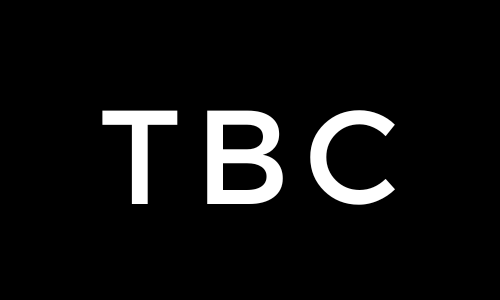In today’s world, it’s super important for any business or website online to be seen and heard. This means knowing who visits their site and when.
Getting lots of people to visit your website isn’t always easy. It can be even harder to figure out how to track who’s coming and how to make your site better for them.
Many website owners struggle with things like:
- Not knowing where their visitors come from.
- Not understanding how people use their website.
- Not knowing how to make their website content more helpful.
- Missing out on ways to get more visitors.
This is where website traffic tools can really help! These tools can show you how people find and use your site so you can make it better and attract more visitors.
In this guide, we’ll explore some of the best free and paid tools to help you reach your online goals.
Best Free SEO Tools
1. Google Analytics
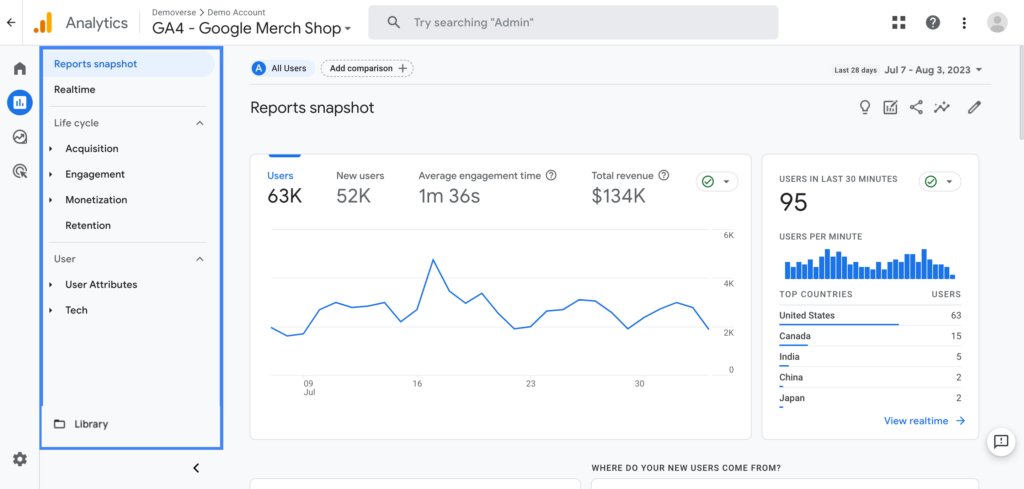
Google Analytics is a really helpful tool that tracks how many people visit your website. It tells you a lot about how your website is doing, like how many pages people view, how long they stay on your site, and how often they leave quickly.
Website owners can use Google Analytics to:
- See what people are doing on their website right now.
- Find out where their visitors are coming from.
- Make their website pages easier to find on search engines.
This free tool gives you tons of information about your website traffic. It’s super helpful for seeing how well your website is doing in search results and getting free visitors.
When you connect Google Analytics with Google Search Console, you can also see your website’s ranking in search engines and get more information about how visible your site is to people searching online.
Pros
- Comprehensive traffic analytics.
- Integration with Google Search Console for rank tracking.
- Real-time tracking of user behavior.
- Detailed insights into traffic sources and organic traffic.
Cons
- The steep learning curve for beginners.
- There is limited support for custom data analysis in the free version.
- Data sampling may affect the accuracy of reports for high-traffic websites.
Key Features
- Traffic metrics such as page views and bounce rate.
- Integration with Google Search Console.
- Real-time tracking of user behavior.
Usability Rating: 9/10
2. Traffic Analytics by SimilarWeb
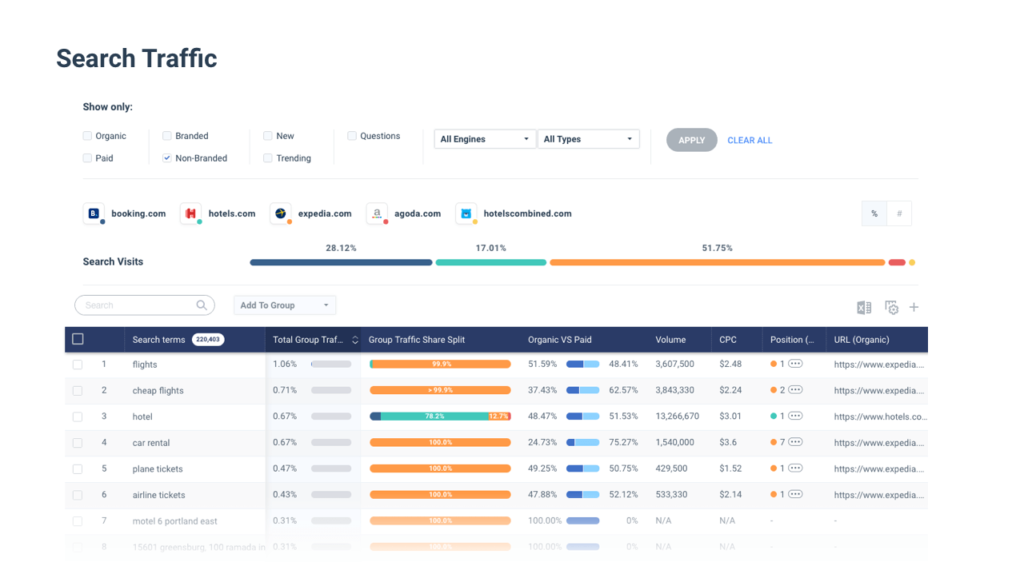
SimilarWeb’s Traffic Analytics is a free tool that tells you about website traffic and how people use your website. It’s a great way to see how well your website is doing in search results and get more visitors from online searches.
This tool shows you where your website traffic comes from, such as:
- Search engines: People finding your site through online searches.
- Links from other websites: People clicking on links to your site from other websites.
- People typing your website address directly into their browser.
This helps website owners figure out the most important ways people are finding their website and improve their online presence.
Traffic Analytics by SimilarWeb gives you a complete picture of how people use your website, including things like how long they stay on your site and which pages they visit first. It also lets you compare your website’s performance to other websites in your industry and see how your competitors are doing.
This makes it a really helpful tool for increasing website traffic.
Pros
- Detailed traffic analytics, including traffic sources and user demographics.
- Competitor analysis for benchmarking performance.
- Insights into organic traffic and search engine visibility.
- Easy-to-use interface with intuitive reporting.
Cons
- Some advanced features may require a paid subscription.
- Limited data export options in the free version.
- Accuracy may vary for smaller websites or niche industries.
Key Features
- Traffic metrics such as average visit duration and landing page analysis.Competitor benchmarking.
- Insights into organic traffic and search engine visibility.
Usability Rating: 7/10
3. Google Search Console
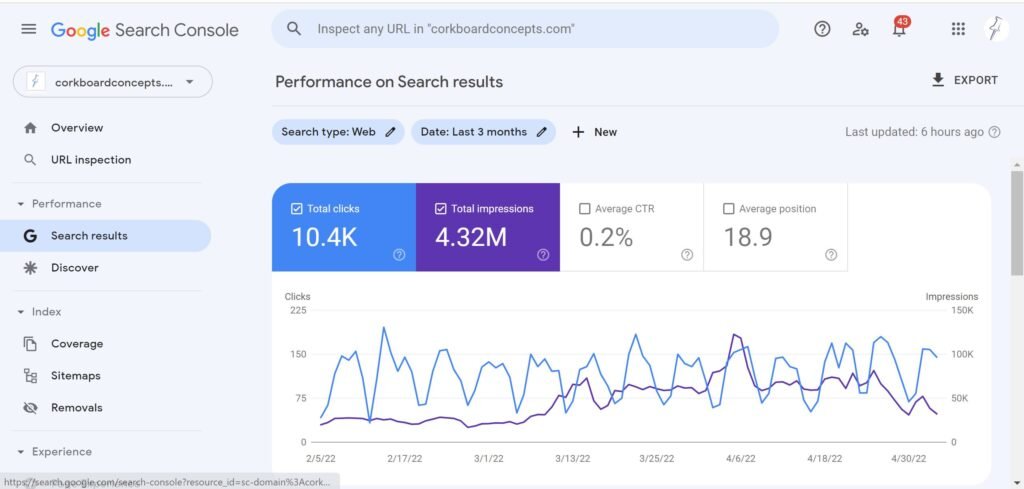
Google Search Console is a free tool that helps website owners keep an eye on their site’s position in Google’s search results and make it better. It gives you useful information about search terms, organic traffic, and how well each web page performs.
Google Search Console lets users keep an eye on their website’s search results, find technical problems that are making it hard for people to see, and improve their website content to make it rank higher in search engines.
Pros
- Insights into search engine performance.
- Alerts for critical website issues.
- Integration with Google Analytics for comprehensive data analysis.
Cons
- Limited historical data.
- It has a less intuitive interface compared to other tools.
Key Features
Search results, search engine, organic traffic, traffic data, website performance, Google integration.
Usability Rating: 8/10
4. Ubersuggest
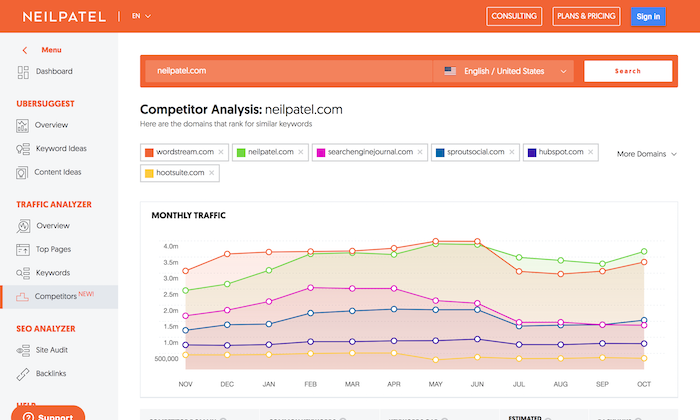
Ubersuggest is a free keyword research tool that gives you helpful information about how often people look for a keyword, how hard it is to rank for, and related keywords. It helps website owners find keywords with a lot of promise to use in their marketing and content. Ubersuggest also has tools for looking at rival websites and finding out what keywords and backlink strategies work best for them.
Pros
- User-friendly interface.
- Comprehensive keyword research capabilities.
- Competitor analysis tools.
Cons
- Limited data compared to paid tools.
- Some advanced features are restricted to paid plans.
Key Features
Keyword research, competitor analysis, search volume, keyword difficulty, and backlink analysis.
Usability Rating: 7/10
5. AnswerThePublic
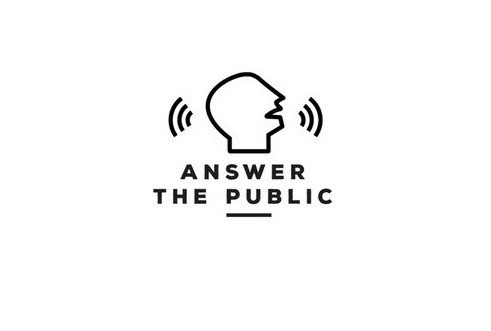
That’s right. AnswerThePublic is a free phrase research tool that helps people find what they want online. It tells you what topics and themes your target audience is interested in so you can write material that meets their needs and fulfills their desires. AnswerThePublic presents search results in a way that is appealing to the eye, which makes it simple to spot patterns and trends.
Pros
- Unique visualization of search queries.
- Insights into user intent and interests.
- Free to use with no registration required.
Cons
- Limited data compared to other keyword research tools.
- Some features are restricted to paid plans.
Key Features
Keyword research, user intent analysis, search query visualization, and content ideation.
Usability Rating: 7/10
Best Paid SEO Tools
1. Semrush
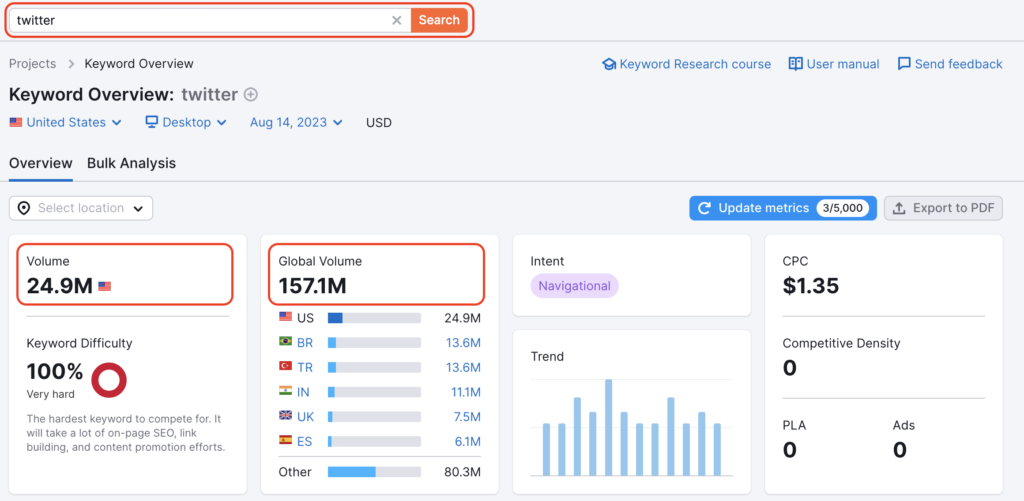
With Semrush, you can do advanced keyword research, competition analysis, and site auditing in one marketing toolkit. It gives you useful information about search engine optimization (SEO) and ways to get more visitors.
Pros
- Comprehensive SEO toolkit.
- In-depth competitor analysis.
- Advanced features for site optimization.
Cons
- The steeper learning curve for beginners.
- Higher pricing compared to some alternatives.
Pricing
Semrush has different price plans. The Pro plan costs $119.95 per month, the Guru plan costs $229.95, and the Business plan costs $449.95 monthly.
Key Features
Semrush offers robust capabilities, including keyword research, competitor analysis, site auditing, backlink analysis, and content optimization tools.
Rating: 9/10
2. Ahrefs

Ahrefs is renowned for its comprehensive SEO toolset, focusing on robust backlink analysis and keyword research capabilities. It helps users understand their website’s traffic, track rankings, and uncover insights for improving online visibility.
Pros
- Extensive backlink analysis.
- Detailed keyword research data.
- User-friendly interface.
Cons
- Relatively higher pricing.
- Limited keyword tracking compared to some competitors.
Pricing
Ahrefs offers pricing plans starting from $99 per month for the Lite plan, $179 per month for the Standard plan, $399 per month for the Advanced plan, and $999 for the Agency plan.
Key Features
Ahrefs provides features such as backlink analysis, keyword research, site audits, and content exploration.
Rating: 9.5/10
3. Moz Pro
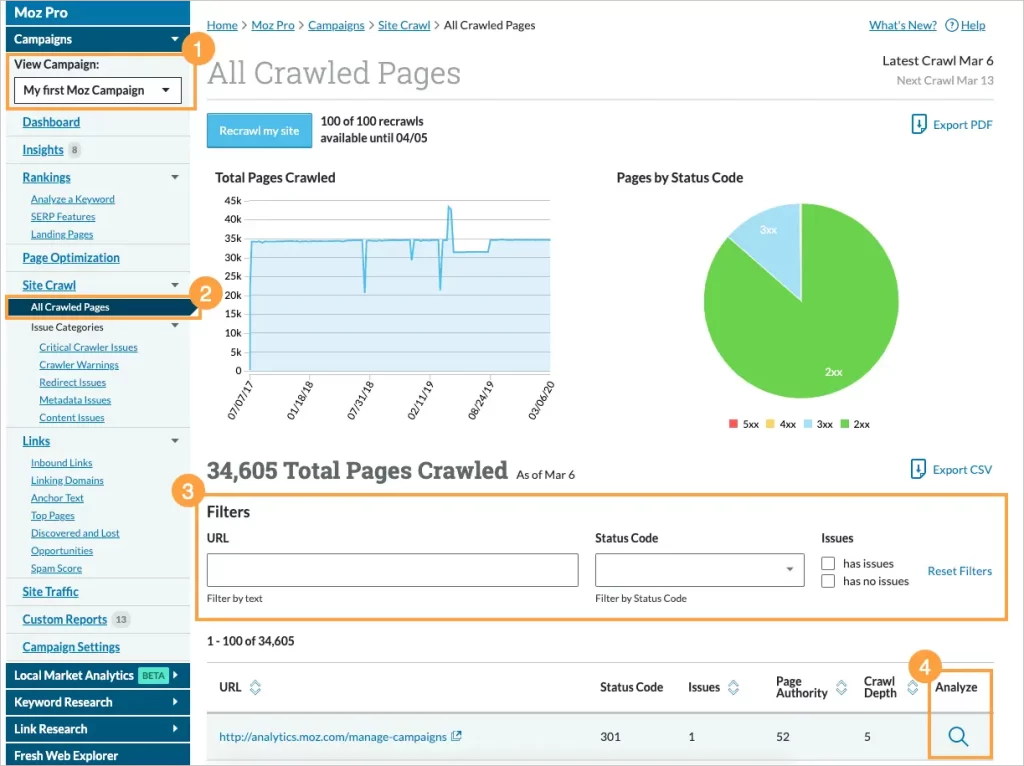
Moz Pro has a set of SEO tools that can help your website rank higher in search engines and be seen by more people. These tools include topic research, rank tracking, and site audits, all of which are meant to help websites get more organic traffic.
Pros
- Wide range of SEO tools.
- Local SEO capabilities.
- Regular updates and improvements.
Cons
- Limited backlink analysis compared to competitors.
- The interface can be overwhelming for beginners.
Pricing
Moz Pro offers pricing plans starting from $99 per month for the Standard plan, $179 per month for the Medium plan, $249 per month for the Large plan, and $599 for the Premium plan.
Key Features
Moz Pro provides keyword research tools, rank tracking, site audits, local SEO tools, and on-page optimization recommendations.
Rating: 8.5/10
4. SE Ranking

SE Ranking provides comprehensive tools for keyword tracking, competitor analysis, and website auditing. It helps users monitor website performance, identify areas for improvement, and track progress over time.
Pros
- Affordable pricing plans.
- Social media management features.
- White-label reporting for agencies.
Cons
- The interface could be more intuitive.
- Limited advanced features compared to some competitors.
Pricing
SE Ranking offers pricing plans starting from $31 per month for the Optimum plan, $71 per month for the Plus plan, $151 per month for the Enterprise plan, and custom pricing for larger businesses.
Key Features
SE Ranking offers keyword tracking, competitor analysis, website auditing, social media management, and white-label reporting options.
Rating: 8/10
5. SpyFu

SpyFu specializes in competitor analysis, allowing users to uncover competitors’ keywords, ad campaigns, and backlink strategies. It helps identify opportunities to improve website traffic and outrank competitors in search results.
Pros
- Extensive competitor analysis features.
- PPC analysis for optimizing advertising campaigns.
- Custom reporting options.
Cons
- Limited keyword tracking compared to some alternatives.
- The interface may feel overwhelming for beginners.
Pricing
SpyFu offers pricing plans starting from $33 per month for the Basic plan, $58 per month for the Professional plan, and $199 per month for the Team plan.
Key Features
SpyFu offers competitor keyword analysis, ad campaign monitoring, backlink tracking, PPC analysis, and custom reporting options.
Rating: 8.5/10
Comparison of Free and Paid Tools
The right tools can make a big difference when managing and improving your website’s speed. To help you decide, here is a list of free and paid SEO tools side by side:
1. Features
- Google Analytics and Traffic Analytics by SimilarWeb are free tools that can help you learn much about website traffic, user behavior, and traffic sources. Even though they give you essential data, they might not be as powerful as paid tools.
- Keyword research, competitor analysis, backlink tracking, and site auditing are just a few features that Semrush, Ahrefs, Moz Pro, SE Ranking, and SpyFu offer. These tools offer more in-depth information and more advanced features for improving the speed of websites.
2. Data Accuracy and Depth
- Free Tools: Google Analytics and Traffic Analytics by SimilarWeb provide essential data accuracy but may lack depth and detail, especially for smaller websites or niche industries.
- Paid Tools: Semrush, Ahrefs, Moz Pro, SE Ranking, and SpyFu offer highly accurate and detailed data, allowing users to gain deeper insights into website performance, competitor strategies, and industry trends.
3. Ease of Use
- Both Google Analytics and Traffic Analytics by SimilarWeb are free tools with easy-to-use interfaces. However, Google Analytics may be more challenging for newbies to learn.
- Paid tools like Semrush, Ahrefs, Moz Pro, SE Ranking, and SpyFu have a lot of features, but they may take some time to get used to because they have so many complicated features.
4. Cost
- Free Tools: Google Analytics and Traffic Analytics are free, meaning website owners can use them on a budget.
- Paid Tools: Semrush, Ahrefs, Moz Pro, SE Ranking, and SpyFu all have different price plans, from basic to more advanced, with more features. When picking a paid tool, users should consider their needs and funds.
5. Support and Updates
- Free Tools: Both Google Analytics and Traffic Analytics by SimilarWeb get updates and upkeep from the companies that make them, but the free versions may not have as much help for custom data analysis.
- Paid Tools: Semrush, Ahrefs, Moz Pro, SE Ranking, and SpyFu all offer regular updates, customer service, and extra tools, such as webinars, community groups, and tutorials, to help users get the most out of their tools.
6. Customization and Integration:
- Free Tools: While Google Analytics integrates seamlessly with Google Search Console, its customization options may be limited in the free version.
- Paid Tools: Semrush, Ahrefs, Moz Pro, SE Ranking, and SpyFu offer advanced customization options and integrations with other tools and platforms, allowing users to tailor their SEO strategies and workflows according to their needs.
Conclusion
Depending on your strategic needs, income, and experience level, picking the right tool can help you improve your website’s performance and reach your SEO goals more quickly.
Website owners can get basic statistics from free tools like Google statistics and Traffic Analytics by SimilarWeb. However, paid tools like Semrush, Ahrefs, Moz Pro, SE Ranking, and SpyFu offer more advanced features, deeper insights, and customization options.
Discover more from The Blog Channel
Subscribe to get the latest posts sent to your email.

